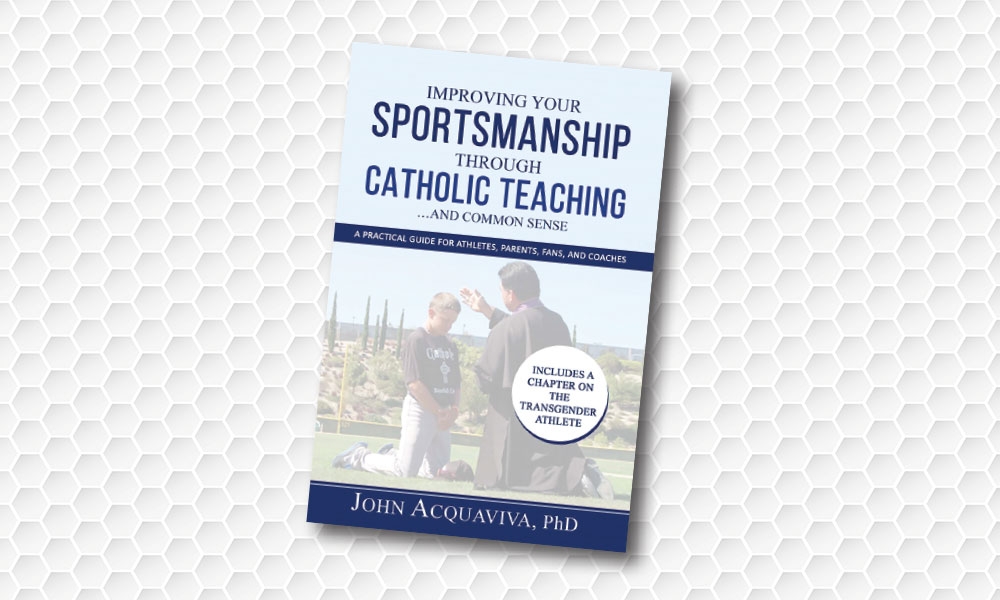
Give thanks to the gift of sport
It goes without saying that Catholics feel closest to their faith when they are attending Mass. For some, the moment they leave Mass, they lose that feeling, like when they get cut off in the church parking lot. That’s why Catholics must take our faith with us everywhere we go, and that includes when we’re playing or watching sports on the field or court.
It goes without saying that Catholics feel closest to their faith when they are attending Mass. For some, the moment they leave Mass, they lose that feeling, like when they get cut off in the church parking lot. That’s why Catholics must take our faith with us everywhere we go, and that includes when we’re playing or watching sports on the field or court.
John Acquaviva knows a thing or two about sportsmanship through Catholic teaching. In fact, he wrote a book about it. The former physical education teacher is a current professor of exercise science at Wingate University in North Carolina, host of Radio Maria’s Faith and Sport show, a national speaker, an author and an involved parishioner at Our Lady of Grace Church in Lancaster.
For many avid fans of sports teams, there remains a struggle between showing up for their team and showing that same dedication to their relationship with Jesus. But do fans sometimes take their spirit for a team too far? Acquaviva said there’s a fine line with being sad when a team loses and being so sad that we are miserable to be around.
“Many athletes equate losing with being a loser, which disrupts our relationship with God,” he said. It means “that we weren’t seeing sports through the lens that he is asking us to see it.”
Acquaviva argues that there are many reasons why Catholics should give thanks for sports, like when St. John Paul II said, “Give thanks to God for the gift of sport.” And in an address to the Italian National Olympic Committee in 1985, John Paul II said that athletic activity “can help every man and woman to recall that moment when God the Creator gave origin to the human person, the masterpiece of his creative work.”
Pope Francis also recognized the importance of sports in our culture.
“Sport is an activity for one’s free time, chosen precisely because it is fun. It offers children a chance to chase a dream, even if they don’t end up becoming champions,” he said.
Pope Benedict XIV said that “sports have considerable educational potential in the context of youth and, for this reason, great importance not only in the use of leisure time but also in the formation of the person.”
He also said that in sports, “young people welcome the opportunity to excel. Is it not equally true that when presented with high ideals they will also aspire to moral virtue and a life of compassion and goodness?”
Think about when we see a major league player score a home run or watch a football player run over 50 yards to score a touchdown: we witness a human being at their physical best. When we watch the Olympics, we see the greatness of humankind’s strength, agility and ability. These are all aspects of our creation by a loving Creator.
Acquaviva states in his book, Improving Your Sportsmanship Through Catholic Teaching … And Common Sense, that the human person is at the center of sports, therefore they allow the term “masterpiece” to come to fruition.
He commented on how players often demonstrate their faith in God while on the field, too.
“Showing our faith through sport can be played out in so many ways. Like when you see a player thanking God after the score. They acknowledge that higher power. Millions are seeing that,” he said.
While recognizing the overall good in sports, there exists some bad: parents who let their egos get in the way while watching their children play, fans who take it too far when they win or lose and start an argument with the opposition’s fans, players and coaches who yell at referees or umpires and the list goes on. Acquaviva said that our “sacramental fate is forgiveness. Are you Christian or not?”
Acquaviva spoke about South Africa hosting the Rugby World Cup in 1995. Then-newly elected President Nelson Mandela took it as an opportunity to bring his divided and wounded nation together. South Africa earned its way to the championship that year, beating New Zealand 15-12 to become the world’s best.
Mandela addressed an overwhelmingly optimistic and enthusiastic crowd before the championship game, recognizing the strides that his nation had made toward unity.
“Politics divides,” he said. “Sport unifies.”
This example shows the impact that sports can have on relationship building, a lesson our culture could use.
Acquaviva grew up playing sports with his four brothers and two sisters. He played professional baseball in Italy in the late 1980s, then became a PE teacher in 1987 while working as a fitness professional for a health club. He eventually earned his master’s in physiology from George Mason University and then a doctorate from Florida State University.
He said his Catholic faith has always been the most important and driving factor in his life. Acquaviva has written two other books about body image. One, he said, Improving Your Sportsmanship… was to demonstrate the importance of sports and how they can bring out Christian beliefs.
The message is that, as Acquaviva said, “All good things in life are an extension of a loving God.”
